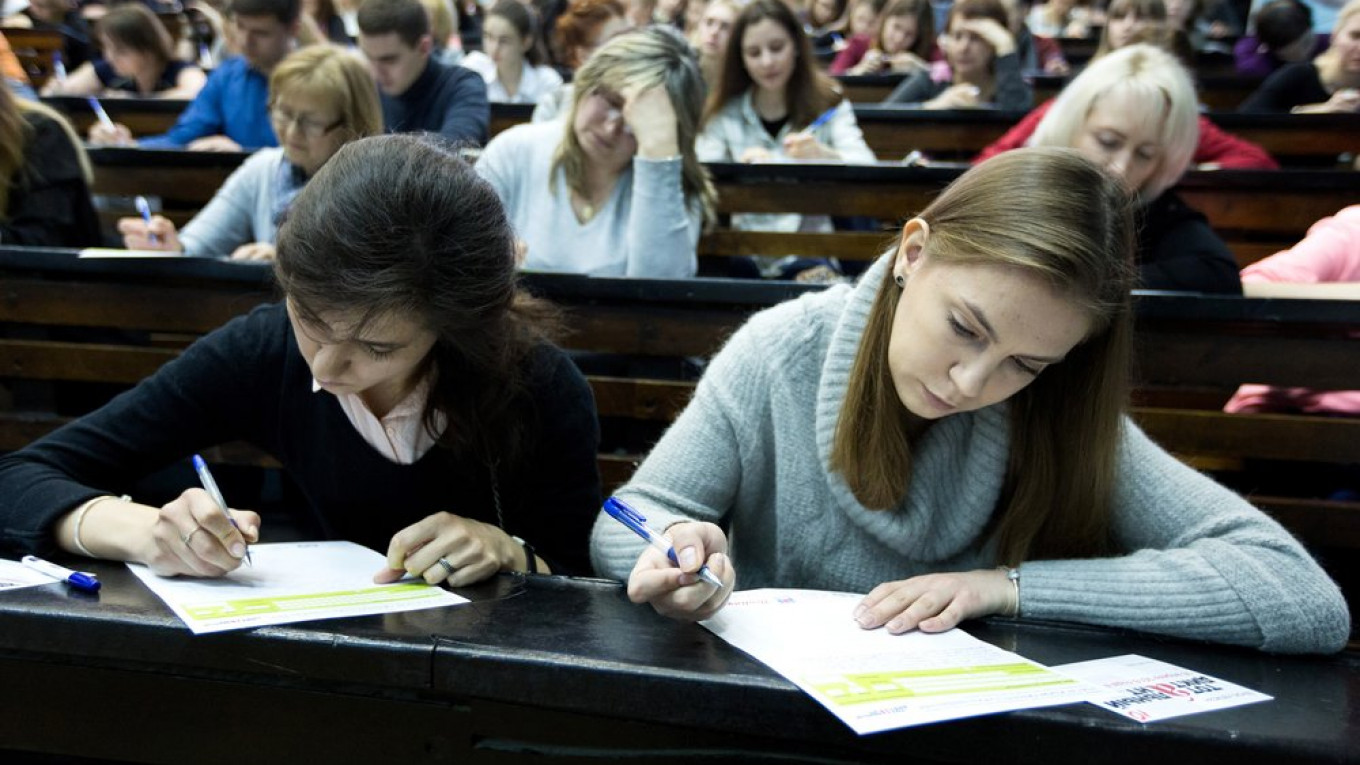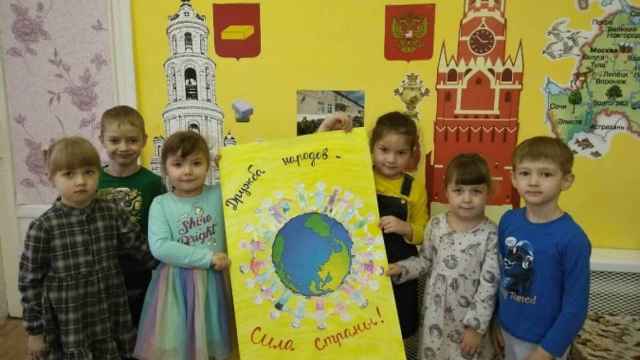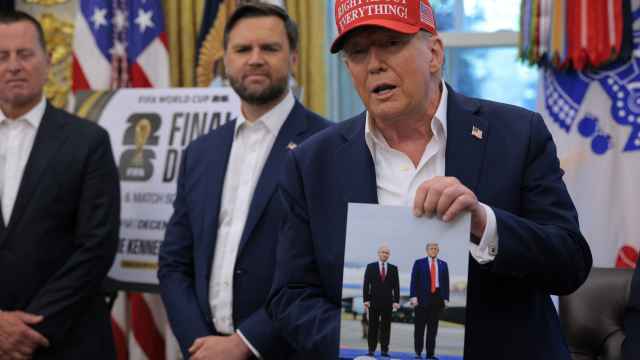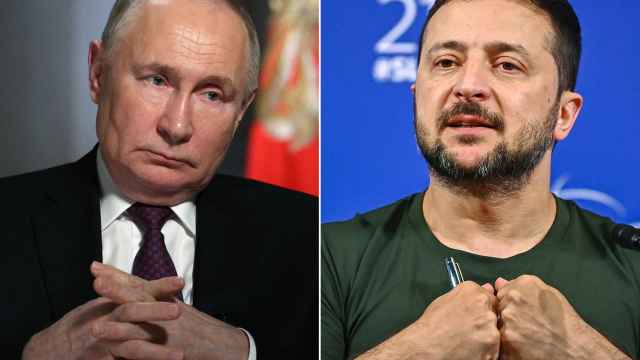Читайте русскую версию здесь.
President Vladimir Putin attended a meeting of the Russian Language Council at the Kremlin a few days ago and made several very significant statements. First, he said that the Russian language is under attack by “cave-dwelling Russophobes” and nationalists. Second, he said the Russian language constitutes a form of soft power. Third, he expressed his views of Wikipedia.
“It would be better to replace it (Wikipedia) with the Great Russian Encyclopedia in electronic form,” he said. “At least this would be credible information.”
This sparked an immediate uproar on social networks consisting of the usual unwholesome mix of fear, humor and feigned indifference. Bloggers, referring to the president as “Gramps” — a moniker that has been in vogue for the last couple of years — pointed out that Putin is out of touch with the real world and modern technologies — an allusion to the well-known fact that he makes no more than occasional use of smartphones and the internet.
Even the usual jokes, though, were tainted by the knowledge that the Russian authorities are capable of anything, including blocking Wikipedia — or at least trying to block it. Of course, it is possible to circumvent such barriers, as happened when the government tried to shut down the Telegram messenger service, but that whole struggle is unpleasant and wearisome.
A couple of days later, presidential spokesman Dmitry Peskov put those worries to rest when he said: “What the president and several other speakers meant was that, with all due respect, there are no guarantees concerning the information published and regularly updated on Wikipedia.”
“There can be no question of any prohibitions or obstacles to accessing Wikipedia,” he added.
That prompted a nationwide sigh of relief. Although few have said it out loud, everyone knows this means that budgetary funds will be appropriated right and left for the further development of the Great Russian Encyclopedia. That is a harmless enough project, and hopefully no sites will be blocked or unwitting individuals slapped with trumped-up charges and hauled off to jail in the process. Everything can continue as it has been.
With one exception: billions of taxpayer rubles will be spent so that some organization or other will act as though it is doing a great job of updating the encyclopedia — a work that absolutely no one will read, just as nobody uses the strictly Russian search engine “Sputnik.”
But siphoning off enormous sums from the federal budget is both tolerated and customary, unfortunately. Thank God, though, at least nobody will get hurt. Sure, some individuals will use that money to build themselves homes in Spain or Montenegro, send their kids to study in Swiss schools and Ivy League colleges, drive around in expensive cars and wear fancy clothes. And all they will have to do in return is pretend that they are participating in the patriotic project of updating a Kremlin-approved encyclopedia. Many Russians would be more than happy to take part in a project with such perks. However, nobody will offer them the job: long lines always form for such government contracts.
What’s interesting here is something else.
Why did the Russian Language Council meet in the first place? Why in the Kremlin? And why was Putin personally involved? Can you imagine a similar meeting held in the White House or at 10 Downing Street to discuss the English language? Hardly. Even in France, where the philological authorities carry great authority, the government does not interfere in such matters.
Such questions are strictly the province of linguists who gather every few years and shock the public by replacing an English word such as “hashtag” with a more acceptable French term such as “mot-dièse.”
The situation in Russia, however, is unique. On the one hand, prior to 1991, only one Russian-speaking state existed in the world — not counting, of course, the Grand Duchy of Lithuania during the Middle Ages. On the other hand, the Soviet government set a very clear course by which the Kremlin held tight control over both literature and the Russian language as such. For example, Josef Stalin authored a pamphlet titled “Marxism and Issues of Linguistics” that, not surprisingly, all Soviet linguists were required to quote.
The combination of these two factors is what makes the Russian language a “soft weapon” or an element of “soft power,” as Putin put it in the Kremlin meeting. Although Russian is spoken in Belarus, Ukraine, Kazakhstan and the Baltic states, Russia plans to maintain strict administrative control over the language from Moscow – and better yet, exercise control over all Russian dictionaries and encyclopedias as well. Hence, Putin’s dissatisfaction with the non-Kremlin-controlled Wikipedia. And in this way, all those people will serve as agents of Russian influence.
By the way, this policy is the very reason the former Soviet republics reject the Russian language: they view it as an instrument of political pressure. If Moscow were to recognize that the Baltic countries can have their own version of the Russian language and would not complain if Ukraine created its own institute of Russian – using slightly different phonetics and vocabulary — then the Russian language would continue to thrive in the post-Soviet space. After all, would someone in New Zealand try to teach a Scotsman how to speak English “correctly”? Of course not.
At least we can take some comfort in knowing that there is no “soft power” in the Russian language, that nobody’s head is on the chopping block, and that this whole Potemkin village is simply one more way to enrich a handful of people with the right connections.
A Message from The Moscow Times:
Dear readers,
We are facing unprecedented challenges. Russia's Prosecutor General's Office has designated The Moscow Times as an "undesirable" organization, criminalizing our work and putting our staff at risk of prosecution. This follows our earlier unjust labeling as a "foreign agent."
These actions are direct attempts to silence independent journalism in Russia. The authorities claim our work "discredits the decisions of the Russian leadership." We see things differently: we strive to provide accurate, unbiased reporting on Russia.
We, the journalists of The Moscow Times, refuse to be silenced. But to continue our work, we need your help.
Your support, no matter how small, makes a world of difference. If you can, please support us monthly starting from just $2. It's quick to set up, and every contribution makes a significant impact.
By supporting The Moscow Times, you're defending open, independent journalism in the face of repression. Thank you for standing with us.
Remind me later.








